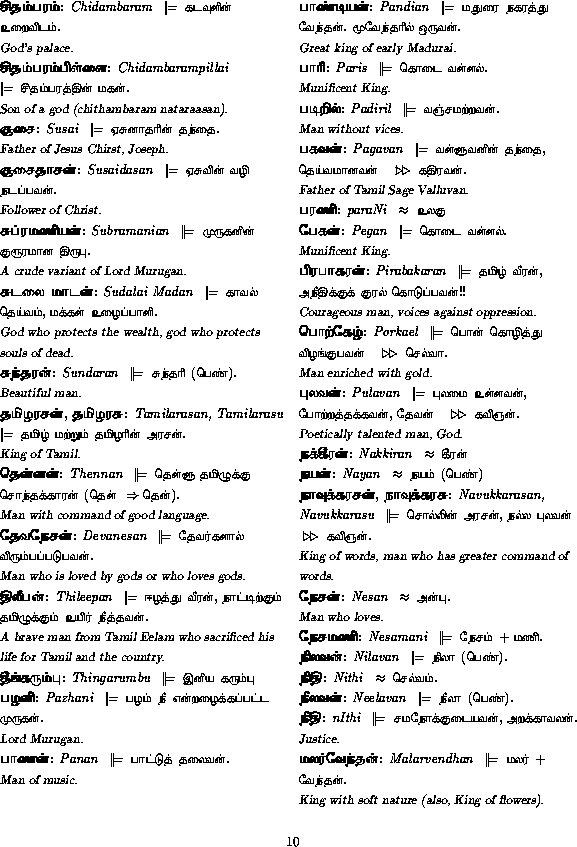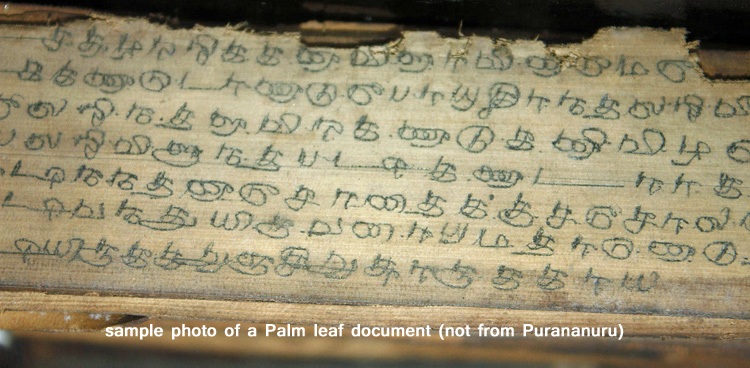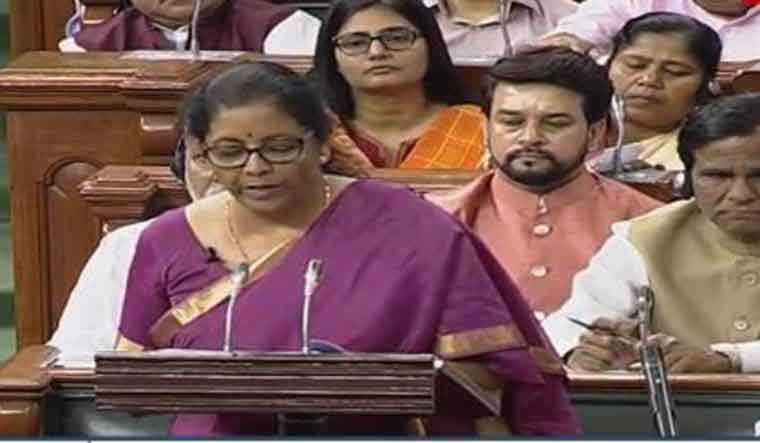

The Purananuru does not, however, follow this system. These are vetchi, when the king provokes war by attacking and stealing the cattle of his enemy vanchi, when the king invades the enemy territory uzhingai, when the king lays a siege of the enemy's fortress thumbai, when the two armies meet on a battlefield vaakai, when the king is victorious paataan, when the poet praises the king on his victory and kanchi, when the poet sings on the fragility of human life. The final portion deals with the general scenery of war and the effect of warfare. The poems at the beginning of the book deal with the three major kings Chola, Chera and Pandya of ancient Tamil Nadu. This gives an opportunity to the poet, among other topics, to describe in great detail the natural beauty, fertility, and resources of the territory that has to be traversed to reach the palace of the patron.

Attruppatai poems read like travelogues in which poets who were returning with gifts, received from a king, encourage other poets to do the same by describing the glory of the king and his country. Purananuru principally revolves around three themes - the king and his powers over the environment, power of women's purity, namely karpu (chastity), and the system of caste, which is not too different from the current system prevalent among Tamil society. These poems exhibit outpourings of affection and emotions. Some of the poems are in the form of elegies in tribute to a fallen hero. This suggests that those who compiled this anthology must have made up these names as the authors' names must have been lost when these poems were collected. Some of the names of the authors, such as Irumpitarthalaiyaar and Kookaikozhiyaar, seem to be nicknames based on words from the poems rather than proper names. Some of the authors of the poems, such as Kapilar and Nakkirar, have also written poems that are part of other anthologies. For example, Mangudi Kizhaar and Mangudi Maruthanaar could denote the same person. However some of these could denote the same author. 47 different names found from the colophons. The commentator Nachinarkiniyaar, of the eleventh. The oldest book of annotations found so far has annotations and commentary on the first 2. Of the poets who wrote these poems, there are men and women, kings and paupers. There is information on the various rulers who ruled the Tamil country before and during the Sangam era.Īnthology. It is dated between 7th century BCE and 5th century BCE. It is a treatise on kingship: what a king should be, how he should act, how he should treat his subjects and how he should show his generosity.
#Purananuru poems in tamil with meaning free#
Purananuru - Wikipedia, the free encyclopedia.
#Purananuru poems in tamil with meaning pdf#
Purananuru with meaning in tamil pdf Download Purananuru with meaning in tamil pdf. Free Download e-Books The automatic transmission slips like hell. Specialization : German- English- Malayalam- Tamil Translation. Get XML access to fix the meaning of your metadata. Tamil Mobile Books: Mobile Profile: Search Books: Featured Downloads: Nalayirat Tivviyap Pirapantam Part2: Tamil Pincode Numbers: Bangalore Important Phone Numbers: Abdul Kalam Profile: Pages of 0 Previous Definitions of Purananuru, synonyms, antonyms, derivatives of Purananuru. Madhan Murali conducts on periyapur.ĪNam on weekly basis. The following MP3 files are from the class Shiva. Thirukkural verses in Tamil (TSCII format) along with the English Translation of Kaviyogi Maharishi Shuddhananda Bharatiar. Kamil Zvelebil eLibrary for books on Tamil and Indian Literature, Culture, Religion and Arts Create a free website or blog at.


Seperation of lovers – Krishna stealing clothes of Gopikas. 0.1 The eight anthologies called Ettuthokai form part of early Tamil literature known as Sangam literature written eighteen.


 0 kommentar(er)
0 kommentar(er)
